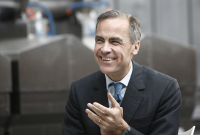Support strong Canadian climate journalism for 2025
This story was originally published by The Guardian and appears here as part of the Climate Desk collaboration.
Sales of SUVs hit a new record in 2023, making up half of all new cars sold globally, data has revealed. Experts warned that the rising sales of the large, heavy vehicles is pushing up the carbon emissions that drive global heating.
The analysis, by the International Energy Agency, found that the rising emissions from SUVs in 2023 made up 20 per cent of the global increase in carbon dioxide, making the vehicles a major cause of the intensifying climate crisis. If SUVs were a country, the IEA said, they would be the world’s fifth-largest emitter, ahead of the national emissions of both Japan and Germany.
Climate-fuelled extreme weather is increasing, with urgent cuts in emissions needed. But emissions from the global transport sector have risen fast in recent years following the pandemic. SUV sales rose 15 per cent in 2023, compared with a 3 per cent rise for conventional cars.
The IEA said the main reasons behind the surge in SUVs were “the appeal of SUVs as a status symbol," marketing by automakers, and perceptions that they are more comfortable. The IEA also said SUVs caused greater injury to pedestrians in collisions due to their higher front-ends, while taking up more space in cities than regular cars.
About 20% of the new SUVs sold in 2023 were pure electric or plug-in hybrids. But the IEA said the larger vehicles needed bigger batteries, putting more pressure on the supply of critical minerals and requiring more electricity to run.
Cars running on petrol or diesel have become more efficient. But the IEA’s Laura Cozzi and Apostolos Petropoulos, who did the analysis, said: “The trend toward heavier and less efficient vehicles such as SUVs has largely nullified the improvements achieved in recent decades.”
James Nix, at the think-tank Transport and Environment (T&E), said: “Carmakers in pursuit of higher margins know only one direction: bigger and heavier. New cars are getting wider every year, and are on track to become as wide as buses and trucks. Europe will go the way of North America unless lawmakers step in with EU width limits and national taxes and parking charges which discourage big SUVs.”
There were more than 360 million SUVs on the roads worldwide in 2023, producing one billion tonnes of carbon dioxide emissions, up about 10 per cent on 2022. As a result, global oil consumption rose by 600,000 barrels a day, more than a quarter of total growth in oil demand, the IEA said. SUVs weigh 200 to 300 kilograms more than an average medium-sized car and emit about 20 per cent more carbon dioxide.
In rich countries, almost 20 million new SUVs were sold in 2023, surpassing a market share of 50 per cent for the first time. Globally, 48 per cent of new cars were SUVs and, including older cars, one in four cars on the road today are SUVs, according to the IEA.
Sales of electric cars are rising rapidly and 55 per cent of these were SUVs in 2023, the IEA data showed. “Shifting from fossil-fuelled cars to electric vehicles is a key strategy for reaching international energy and climate goals,” Cozzi and Petropoulos said. But they said using fewer materials to produce cars was also “essential for a sustainable future”.
Some countries, including France, Norway and Ireland, are working to rein in demand for SUVs, with Paris tripling parking charges for the large vehicles.
In March, T&E said that the UK was a “tax haven” for polluting SUVs, as the vehicle excise duty for them in the first year is a fraction of that in other countries. The mayor of London, Sadiq Khan, said in February he would monitor the effectiveness of the Paris plan.







Comments
This says it all: "The IEA said the main reasons behind the surge in SUVs were 'the appeal of SUVs as a status symbol,' marketing by automakers, and perceptions that they are more comfortable."
I remember being told that Canadians would rather die comfortable than live uncomfortable (which was a false dichotomy at the time, but deniers and delayers have ensured that any transition we're still able to make away from fossil fuels will indeed now include sacrifice and discomfort).
But "status before survival" is a new one to me. New and disgusting.
I will agree that certain SUVs, typically the large gas guzzlers type where you can almost live in due to size is likely a status symbol. But owning a Ford Escape or Hyundai SUV isn't anywhere near a status symbol. That is where the study lacks real merit to point out what SUV segment you can attach the status symbol label onto. The study lumps them all together with the same label which is wrong.
I do see however automaker ads that hype up smaller SUVs to the younger generation, but they are far from a status symbol.
I think all SUVs are getting a bad wrap here, as the typical size (i.e. Ford Escape size or equivalent) most common are not that different in fuel efficiency as the typical vehicle in use. However, there a certain people who buy the excessively big gas guzzling SUVs and the typical excuse is I need the extra room for the kids and all their gear. In other cases, there is zero justification to own a large SUV and you are the sole occupant or a couple with no kids or need for all that space. Most muscle cars are far worse than SUVs when it comes to pollution, as are couples who own a gas guzzling pickup trucks needlessly.
This study would hold more merit if they break down the SUV sizes to point out the SUVs that indeed pollute more of concern than lumping SUVs into a single bucket. Then, compare SUV sizes to typical sedans in use. Just because there are more SUVs on the road than other vehicle types, doesn't mean they are all bad when compare to sedans or coups, nor should they get a bad wrap.
I current own a Ford Escape and get about 9.2 L/100km driving responsibly and have no plans to get into an EV at my age. I owned a Honda Civic prior to owning an Ford Escape SUV and it did not get any better consumption that the Ford Escape. I have nothing against owning a EV, but being basically retired, don't want to add vehicle payments to an already limited budget, where my current vehicle is fully paid for.
The other factor with published fuel efficiency from automakers, none of them get these ideal figures and none reflect real world driving conditions.
SUVs are getting a bad rap because SUVs are, environmentally speaking, terrible across the board, and no amount of whatabouts, false equivalencies, propaganda, and defensiveness in the guise of calls for "better studies" will change that.
Not all are bad to be fair.